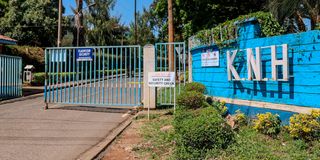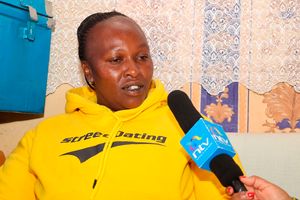
Kenyatta National Hospital entrance pictured on February 8, 2025.
Kenyatta National Hospital (KNH), ten years apart, is again under scrutiny after the brutal murder of a patient inside a ward.
The latest case raises fresh doubts about whether promises by the hospital management to seal security loopholes after a 2015 murder were ever fulfilled, even as the facility pledges to cooperate with the investigating agencies.
Ten years ago, a life was taken within the walls of Kenya’s largest referral hospital. After the tragedy, officials pledged change.
Yet the facility a decade later, is facing the same devastating reality— another patient, another life lost, and the same unanswered questions.
KNH on Sunday confirmed that Gilbert Kinyua Muthoni was under its care when his life was cut short, quite literally by throat slitting.
Referred to KNH from St. Mary's Hospital, Lang’ata, on December 11, 2024, he was murdered 58 days later at the facility where he had sought medical attention for a neurological condition.
Clarifying earlier reports, the hospital on Sunday noted that he had been admitted to Ward 7B, which specialises in neurological disorders. Upon admission, KNH said, it was observed that Kinyua had pressure ulcers due to prolonged immobility.
“He was diagnosed with a rare neurological disorder that causes muscle weakness. His condition was particularly severe, affecting all his limbs. He therefore required total nursing care, including tube feeding,” KNH Acting CEO William Sigilai said.
Striking similarities
Despite this, concerns mount over the striking similarities between Kinyua’s case and the murder of Cosmas Mutunga at the same facility ten years ago.
On February 6, 2025, KNH said that Kinyua's condition was “observed to be stable, and the day proceeded as normal.” The night shift team took over without noting anything unusual.
A decade earlier, on November 29, 2015, Mutunga had also been reported stable at 4am before meeting his gruesome end.
Just like Kinyua, “nothing unusual was detected or reported” before his murder, KNH told the National Assembly’s health committee back then.
Regarding Kinyua’s case, KNH reiterated on Sunday that “the nursing staff attended to him at 9pm, midnight, and 3 am, and no abnormalities were reported during these routine checks.”
However, at around 6 am on February 7, during routine ward rounds, a nurse found Kinyua’s face covered with a blood-stained sheet. When uncovered, he was motionless, his throat slit.
In both cases, the timing raises critical questions. Mutunga was last checked at 4am and found dead by 5.30am. Kinyua, checked at 3am, was fine —but was gone by the next check.
Also worth noting is that these incidents occurred around the time night shifts end and day shifts begin.
In Mutunga’s case, the committee had noted, “The murder took place between 4am (when the last observation was made) and 5am (when the nurses were changing shifts). Given the description of the stab wounds, it was possible that the patient had been sedated by the time of the murder since he did not make any noise or scream for help.”
Kinyua had been placed in the corner of Ward 7B on the seventh floor, sharing a cubicle with one other patient in a ward housing seven people, Kinyua’s family told Nation.
Four nurses
According to KNH Acting CEO William Sigilai, the ward is L-shaped, with nurses stationed in four corners. That night, the facility said, four nurses were on duty.
In Mutunga’s case, he shared a cubicle with a cancer patient described in parliamentary reports as mentally impaired, unable to hear or speak.
A blunt metallic object, suspected to have been the murder weapon, was found on the bed next to Mutunga’s body.
But Kinyua’s wife, Susan Wanjiku, still can’t comprehend how no one noticed anything.
"When I saw him, I was too shocked to speak. There was a pool of blood on the bed and his clothes. The way his neck had been cut —it was from side to side, and it was not a straight cut. There were marks of struggle, as if someone had used a blunt object. And they seem to have had time," said Susan, a 40-year-old tea hawker in Dandora, in a previous interview with Nation.
Following Mutunga’s death in 2015, the parliamentary committee recommended increased security at KNH, urging the management to install CCTV cameras and deploy more security personnel to protect staff, patients, and visitors.
On Sunday, KNH defended its security measures.
“We have an elaborate security system in place, including CCTV cameras in common areas. Additionally, we have officers from the National Police Service stationed within the hospital, and we are in close proximity to a police post,” said Dr Sigilai.
But with history repeating itself so tragically, it’s clear that these measures are failing the very people they are meant to protect.









